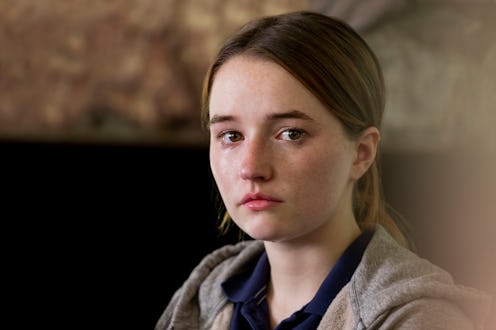Entertainment
'Unbelievable' Tells The Wrenching True Story Of A Rape Survivor Who Wasn't Believed

Content warning: This post contains discussion of sexual assault. Netflix's new crime drama, Unbelievable, is based on the true story of Marie, a Washington state woman who was charged with false reporting after she admitted to lying about being raped. Except she wasn't lying: she was the victim of a serial rapist who was later caught and sentenced to 327 years in prison.
Her story is documented in a 2015 joint ProPublica and The Marshall Project article titled "An Unbelievable Story of Rape," which traces how Marie was essentially silenced by law enforcement. When her rapist was apprehended years later by two female detectives several states over, sex crimes supervisor Sgt. Gregg Rinta wrote in his outside review of the case that it wasn't surprising Marie recanted her statement given the "bullying" and "hounding" she was subjected to by detectives, whose threats of jail time and possible withdrawal of housing if Marie failed a polygraph he called "coercive, cruel, and unbelievably unprofessional."
The article bounces back and forth between 2008 and 2011 — a format that the show replicates. In 2008, an 18-year-old Marie, fresh out of foster care, reported that she'd been raped by a man who entered her apartment in Lynnwood, Washington while she was sleeping. He wore a black mask, held her at knifepoint, and tied her up with her own shoestrings. He took photographs of the assault and then made her wash off the evidence.
When she later told her two former foster moms about the attack, they questioned the validity of her statements enough to pass their doubts on to the police. The detectives then confronted Marie, who retracted her report. Afterward, she was publicly shamed by her family, peers, and community and put on probation for filing a false report.
In 2011, Golden, Colorado, Detective Stacy Galbraith contacted Westminster Detective Edna Hendershot about two similar rape cases they were investigating: a man entered the house while the woman was sleeping. He tied her hands, took photos of her, and made her shower afterwards. (In the show, the detectives' names have been changed to Karen Duvall and Grace Rasmussen.) Different stations rarely work together, and Galbraith only learned about Hendershot's similar case because her husband happened to work at the Westminster office.
Over the course of five weeks, the two women pushed through a meager collection of evidence until they were finally able to trace it all back to an Army vet in Colorado: Marc O'Leary, who ultimately pled guilty to 28 counts of rape. After cracking his hard drive, Duvall and Rasmussen found pictures of Marie, who was not on their original list of victims because the Lynnwood detectives had dismissed the case as a false report and closed it.
The painful tragedy of this is revealed at the end of the article: the survivors who Galbraith and Hendershot were working with had all been assaulted after Marie. "If Washington had just paid attention a little bit more, I probably would have been a person of interest earlier on," O'Leary told detectives after his arrest.
Marie's story was later captured in a This American Life episode titled "Anatomy of Doubt," and was eventually turned into a book titled A False Report: A True Story of Rape in America that was written by the original article's authors T. Christian Miller and Ken Armstrong.
"The focus of the investigation became [Marie's] credibility. And instead of interviewing Marie as a victim, they began interrogating her as a suspect. Marie buckled under that pressure," Armstrong explained to NPR. "The police in Colorado got it right. They did not begin by doubting. They listened to the victims there. They showed respect. They reserved judgment. And then they investigated thoroughly. Maybe most important, what the police in Colorado did is they shared information."
The details of Unbelievable feel, quite literally, unbelievable, but that's exactly why it's important to shine on a light on Marie's story: to expose a criminal justice system that is systemically stacked against survivors, and to highlight why it's so critical that we listen to them.
If you or someone you know has been sexually assaulted, call the National Sexual Assault Telephone Hotline at 800-656-HOPE (4673) or visit online.rainn.org.